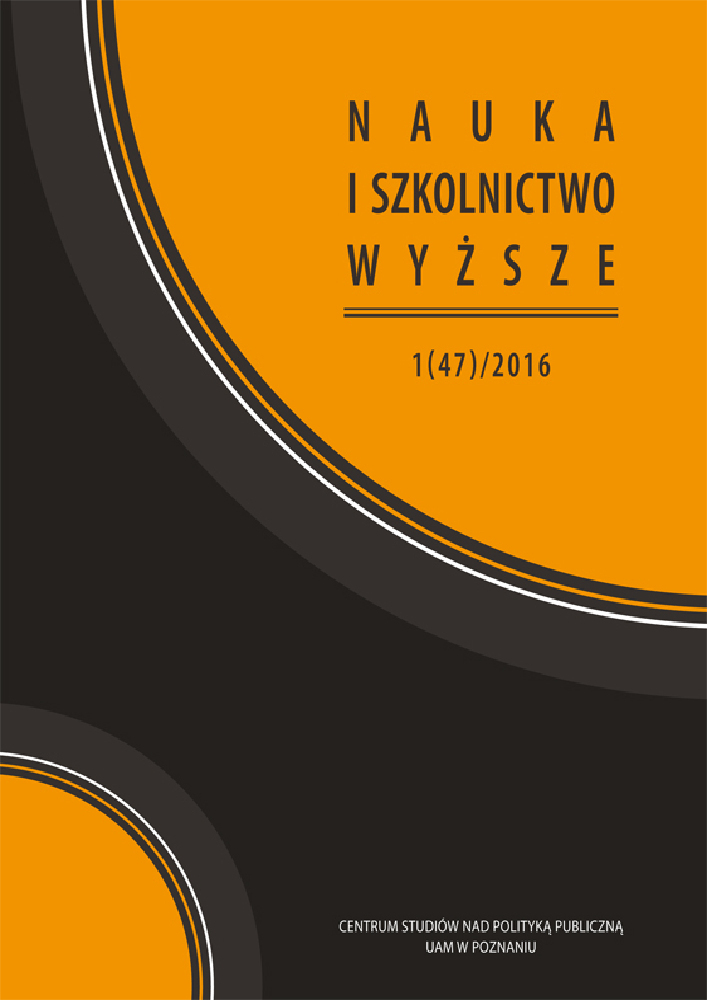Abstrakt
Artykuł przedstawia wyniki badań jakościowych dotyczących osób ze stopniem doktora, pracujących na polskich uczelniach, odnoszące się do ich mobilności międzynarodowej. Pod uwagę wzięto opinie o mobilności, doświadczenia mobilności (nieliczne staże naukowe wśród badanych), a także bariery, które według rozmówców utrudniają im mobilność. Szczególną uwagę poświęcono kwestiom rodzinnym (partnerom i dzieciom), a także kompetencjom językowym i warunkom pracy. Deklaracje dotyczące mobilności porównano z danymi na temat sposobów utrzymania się doktorów. Dla części doktorów dochód małżonka jest podstawowym źródłem utrzymania, z czego można wysnuć wniosek, że nie zaryzykują utraty przez małżonka pracy, nawet jeśli mobilność będzie bardziej wymagana niż obecnie.
Bibliografia
Ackers, L. (2004). Managing relationships in peripatetic careers: Scientific mobility in the european union. Women’s Studies International Forum. 27(3): 189-201.
Ackers, L., Balch, A., Scott, S., Currie, S., Millard, D. (2009). The Gender Dimension of Geographic Labour Mobility in the European Union. http://www.europarl.europa.eu/committees/fr/studiesdownload.html?languageDocument=EN&file=28228 [30.09.2016].
Altbach, P.G., Knight, J. (2007). The Internationalization of Higher Education: Motivations and Realities. Journal o f Studies in International Education. 11 (3-4): 290-305.
Arai, K. (2010). Japanese science in a global world. Science. 328(5983): 1207.
Baruffaldi, S.H., Landoni, P. (2012). Return mobility and scientific productivity of researchers working abroad: The role of home country linkages. Research Policy. 41 (9): 1655-1665.
Batorski, D., Bojanowski, M., Czerniawska, D. (2009). Diagnoza mobilności instytucjonalnej i geograficznej osób ze stopniem doktora w Polsce. http://www.nauka.gov.pl/analizy-raporty-statystyki/diagnoza-mobilnosci-instytucjonalnej-i-geograficznej-osobze-stopniem-doktora-w-polsce-w-roku-2009,archiwum,1,akcja,pdf.html [30.09.2016].
Bauder, H. (2015). The international mobility of academics: A labour market perspective. International Migration. 53(1): 83-96.
Boring, P., Flanagan, K., Gagliardi, D., Kaloudis, A., Karakasidou, A. (2015). International mobility: Findings from a survey of researchers in the EU. Science and Public Policy. 1-16.
Canibano, C., Bozeman, B. (2009). Curriculum vitae method in science policy and research evaluation: The state-of-the-art. Research Evaluation. 18(2): 86-94.
Corley, E.A., Sabharwal, M. (2007). Foreign-born academic scientists and engineers: Producing more and getting less than their U.S.-born peers? Research in Higher Education. 48(8): 909-940.
Czaika, M., Toma, S. (2015). Working Papers Path-dependency in International Academic Careers (No. 108). Oxford: International Migration Institute.
Dillon, N. (2001). Tackling the postdoc brain drain. European Molecular Biology Organization Reports. 2(9): 746-747. http://doi.org/10.1093/embo-reports/kve190 [30.09.2016].
Fahey, J., Kenway, J. (2010a). International academic mobility: problematic and possible paradigms. Discourse: Studies in the Cultural Politics o f Education. 31(5): 563-575.
Fahey, J., Kenway, J. (2010b). Moving ideas and mobile researchers: Australia in the global context. Australian Educational Researcher. 37(4): 103-114.
IDEA Consult (2010). Study on mobility patterns and career paths of EU researchers. FINAL Technical Report 3: Extra-EU mobility pilot study. http://cdigital.uv.mx/bitstream/123456789/33768/1/studyonmobility.pdf [30.09.2016].
Jarausch, K.H. (2005). Challenges of Internationalization: Careers in Humanities and Social Sciences. Arbeits- und Diskussionspapier. 3: 32-34.
Jons, H. (2009). „Brain circulation” and transnational knowledge networks: Studying longterm effects of academic mobility to Germany, 1954-2000. Global Networks. 9 (3): 315338.
Kidd, J.M., Green, F. (2006). The careers of research scientists: Predictors of three dimensions of career commitment and intention to leave science. Personnel Review. 35(3): 229-251.
Kim, S. (2010). From Brain Drain to Brain Competition: Changing Opportunities and the Career Patterns of US-Trained Korean Academics. W: C.T. Clotfelter (red.). American Universities in a Global Market (335-369). Chicago: University of Chicago Press.
Kim, T. (2010). Transnational academic mobility, knowledge, and identity capital. Discourse: Studies in the Cultural Politics of Education. 31(5): 577-591.
Kowzan, P., Zielińska, M., Kleina-Gwizdała, A., Prusinowska, M. (2016). „Nie zostaje mi czasu na pracę naukową” Warunki pracy osób ze stopniem doktora, zatrudnionych na polskich uczelniach. Gdańsk - Bydgoszcz - Warszawa: Nowe Otwarcie Uniwersytetu. https://noweotwarcie.files.wordpress.com/2016/04/nie-zostaje-mi-czasu-napracc499-naukowc485-raport-nou3.pdf [30.09.2016].
Kwiek, M., Antonowicz, D. (2015). The Changing Paths in Academic Careers in European Universities: Minor Steps and Major Milestones. W: T. Fumasoli, G. Goastellec, B.M. Kehm (red.). Academic Work and Careers in Europe: Trends, Challenges, Perspectives (41-68). Cham - Heidelberg - New York - Dordrecht - London: Springer.
Lehn, T. (2016). Academic Mobility: The Transnational Flow of U.S. Academic Staff to Higher Education Institutions in the Countries of the Gulf Cooperation Council. Minneapolis: University of Minnesota.
McNair, S. (2009). Migration, Communities and Lifelong Learning. IFLL Thematic Paper 3. Leicester: National Institute of Adult Continuing Education.
Morano-Foadi, S. (2005). Scientific mobility, career progression, and excellence in the European Research Area. International Migration. 43(5): 133-162.
Musselin, C. (2004). Towards a European Academic Labour Market? Some Lessons Drawn from Empirical Studies on Academic Mobility Towards a European academic labour market? Some lessons drawn from empirical studies on academic mobility. Higher Education. 48(1): 55-78.
Paradeise, C., Thoenig, J.-C. (2013). Academic Institutions in Search of Quality: local orders and global standards. Organization Studies. 34(2): 189-218.
Stephan, P., Franzoni, C., Scellato, G. (2016). Global competition for scientific talent: Evidence from location decisions of PhDs and postdocs in 16 countries. Industrial and Corporate Change. 25(3): 457-485.
VohHdalovå, M. (2014). Academic mobility in the context of linked lives. Human Affairs. 24(1): 89-102.
Wagner, I. (2011). Becoming Transnational Professional. Kariery i mobilność polskich elit naukowych. Warszawa: Scholar.
Zielińska, M. (2016). Autoreferat rozprawy doktorskiej pt. „Miejsce, mobilność i edukacja. Dorośli Polacy w Reykjaviku”. https://www.academia.edu/24197664/Autoreferat_rozprawy_doktorskiej_pt._Miejsce_mobilno%C5%9B%C4%87_i_edukacja._Doro%C5%9Bli_Polacy_w_Reykjaviku [30.09.2016].
Zielińska, M., Kowzan, P., Ragnarsdóttir, H. (2014). Polish complementary schools in Iceland and England. Intercultural Education. 25 (5): 405-417.
